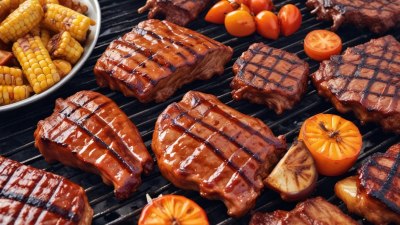The Science Behind Why BBQ Season = Eat First, Regret Later
Explore the psychology and biology of BBQ season indulgence. Why we eat first and regret later!

This image was created with the assistance of Freepik
As summer rolls around, the tantalizing aroma of barbecued meats wafts through the air, summoning friends and families to the backyard. The BBQ season is upon us, and with it comes the age-old dilemma: the initial joyous indulgence followed by a pang of regret. Why does this happen? What science lies behind our choice to eat first and then grapple with post-BBQ remorse?
The Allure of BBQ
BBQs are more than just a cooking method; they represent social gatherings, celebration, and often, nostalgia. The sight of sizzling burgers and the smell of caramelizing fat triggers immediate cravings, drawing us into a primal culinary experience. Our brains are wired to respond strongly to high-calorie foods, just what most BBQ meals offer. These calorie-dense foods like ribs, sausages, and fried sides provide quick and powerful bursts of pleasure, often leading to impulsive eating behaviors.
The Role of the Brain
When we perceive delicious food, the brain releases dopamine, a neurotransmitter associated with pleasure. This response can overshadow feelings of fullness and lead us to load up our plates before we even consider how much we should be eating. Moreover, BBQ environments are often filled with friends and laughter, amplifying our excitement and reducing our ability to self-regulate.
Visual Cues and Portions
The sight of an abundant spread can prompt overeating due to social norms and competition. At a BBQ, sharing is less about the food and more about camaraderie. Research shows we often eat more when in groups since we mirror others' behavior. On a subconscious level, we perceive larger portions or abundance as an invitation to indulge. This phenomenon ties back to our evolution; in hunter-gatherer societies, scarcity made food valuable, so gorging when it’s available makes instinctual sense.
The Psychology of Regret
After the feast, it’s common to feel bloated or guilty, marking the transition from pleasure to regret. This regret can stem from several factors: eating past the point of fullness, choosing unhealthy options, or failing to honor dietary restrictions. A study published in the journal “Appetite” revealed that while people enjoyed their BBQ meals, they often felt discontented afterward, with many expressing retrospective caution about their food choices.
Guilt and Emotional Eating
The emotional component of eating plays a significant role in BBQ season experiences. Often, BBQs are a chance to celebrate good times with family and friends, but they can also lead to feelings of guilt. The cultural context of BBQs as an indulgence puts pressure on individuals to partake in excess. When combined with guilt, this can create a vicious cycle where individuals either avoid future BBQs to prevent regret or overcompensate in later meals, unknowingly perpetuating the unhealthy behavior.
Strategies for Mindful BBQ Eating
To combat the regret that often follows BBQ season, consider implementing a few mindful strategies. First, practice portion control by deciding how much to eat before you load your plate. Start with smaller servings; you can always go back for seconds if still hungry. Focus on enjoying the flavors and textures of the food rather than mindlessly munching. Stay hydrated, as thirst can sometimes masquerade as hunger.
The Power of Balance
Another strategy is to balance your plate. If you know a BBQ has rich meats and fried foods, aim to include vegetables or lighter sides to create a more rounded meal. A colorful array of fresh salads or grilled veggies can be both satisfying and nutritious. This helps create a meal where you savor every bite without overwhelming your body with too much unhealthy food.
Social Support
Engaging friends and family in mindful eating can also make a significant difference. Discussing healthy choices or planning meals together creates a supportive atmosphere where everyone can enjoy the BBQ while keeping portion sizes in check. When others participate in mindful eating, it’s easier to adhere to similar practices yourself.
Physical Activity
Incorporating some form of physical activity before or after a BBQ can alleviate some of the guilt associated with indulgence. Whether it’s an outdoor game with friends or a leisurely walk, movement can help balance caloric intake and improve overall digestion. Not only does this counter the effects of overeating, but it also turns the gathering into a wholesome event filled with fun.
The Science of Flavor
Understand the science behind specific BBQ flavors. The Maillard reaction on meats gives off irresistible tastes and smells, appealing to our primal instincts. Grilling enhances the umami flavor, which is a major signal to our brain that we’re consuming something savory, further igniting desire. Our senses play a vital role in our decision-making around food and can lead to eating beyond fullness.
The Role of Our Senses
During a BBQ, visuals, sounds, and smells stimulate our senses, often disconnected from the physiological cues telling us to stop. The bright colors of food, the sound of crackling grill, and sizzling meat unify to create an irresistible feast. Engaging all senses makes it easy to become overwhelmed and overindulge without realizing it.
BBQ season is undeniably enticing, inviting us to eat first and sometimes regret later. Understanding the science behind our eating behaviors—how our brains work, the influence of the environment, and the power of social interaction—can aid in mitigating regretful eating experiences. By adopting mindful strategies and being aware of our responses to the stimuli around us, we can enjoy BBQs without sacrificing health or enjoyment. Ultimately, the goal is to savor the experience, enjoying summer's best flavors while maintaining a healthy relationship with food.











